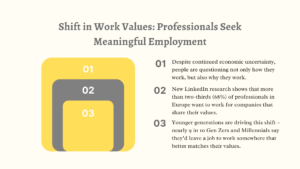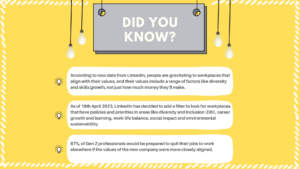It is that time of the year. Bonuses are paid out, promotions announced. Yet, you will find a few of your team members sending in their resignations and you are left baffled.
The most instinctive response is, “How could they!” or “After all that we’ve done for them!” or “Oh man, I can’t believe another one threw in their hat”. Law firms are losing talent to competition and other professions. The typical resources spent on hiring a resource is high and so retention of talent seems imperative to law firms.
In 2023, with the post-pandemic effect looming large, a lot of legal professionals are also taking the time to address existential questions about the larger purpose, whether they are truly happy and how best to transition to roles that will give them joy and peace of mind.

The legal profession has also experienced a significant turnover due to a combination of factors such as difficulties in achieving work-life balance, insufficient compensation, mental health concerns, partners showing favoritism, growing ambitions, and the temptation of leadership positions. This has resulted in a cocktail of challenges that are causing people to leave the profession in large numbers.
It seems law firms and managing partners are often grappling with attrition and an inability to understand why GenZ and the millennials aren’t as solid a workforce or half as committed as they were.

It is becoming increasingly imperative, for law firms to acknowledge, that while lawyering may be a profession, jobs at law firms are like any other job with a corporate. People who come in will move on from a particular organization for one or multiple reasons.
In this article, we are using a very interesting value that the leadership at LinkedIn coined. At LinkedIn, from the moment you walk in, there is a frequent reference made to “Next Play”. The leadership will talk about this at the “all hands” and your managers will reference this in your weekly meetings too. Jeff Weiner, the once upon a time CEO at LinkedIn introduced this term and made it part of LinkedIn’s cultural DNA.
Next Play is a borrowed concept from Duke’s legendary ‘Coach K’ Mike Krzyzewski. “Every time the basketball team goes up and down the court and they complete a sequence, offense or defense, Coach K yells out the exact same thing, every time. He yells out “Next play!” because he doesn’t want the team lingering too long on what just took place,” Weiner said in an interview with The New York Times.
When I started at LinkedIn, Mike Gamson (SVP, Global Solutions) spoke to the “newcomers” for the very first time.
“Welcome to LinkedIn! Two years from now, none of you will be in the same job you were hired for.” I was taken aback by this statement, considering we had only just arrived and the discussion had already turned to the possibility of leaving.
LinkedIn acknowledges, at the very outset, that one who comes in, must go out. What they mean by this, is simple. You may transition to another role either at the organization or at another organization. But that isn’t half as important as you gathering the right skills along the way and creating a valuable impact during your time in your current role.
As lawyers who run very profitable practices, it may be worth pausing for a moment to take a leaf out of LinkedIn’s playbook. It is crucial for the health of any law firm practice, and the longevity of goodwill of the firm’s brand, that when people decide to move on, we let them move on with their honour and dignity intact. After all, your response to exits will have a lasting influence on your firm’s reputation and ability to attract new talent.
We have all heard horror stories of the exits at law firms, how quickly things turn unpleasant, and how the blue-eyed boy or girl is metamorphosed into the black sheep. My personal favourite is where a managing partner fired an associate who he knew was going to quit that evening!
Can we pause and reflect as to why we take exits so poorly, why it turns acrimonious so quickly, and why we personalize these losses to the extent that we do? We often wrongly assume that because someone was “employed” with us, de facto, they cannot leave. We build a false sense of entitlement around their careers, their aspirations and their freedom.
To take this culture a notch higher, LinkedIn has a “Boomerang Employee Program”, where they welcome back their exes (quite literally!) who have been at other organizations but would like to come back to explore new roles with LinkedIn. This way they bring back new skills and learnings to broaden LinkedIn’s cultural and work expanse.
LinkedIn also has a very robust alumni network which ensures that people are able to stay connected with each other. Here LinkedIn is actively involved in keeping the community close, engaged and rolls out some fun benefits for their exes 🙂
While this may seem like a LinkedIn promotion post, it is, in fact, an attempt to bring LinkedIn’s learnings to the table from a management standpoint. The leadership styles that prioritize empathy and employee well-being have been adopted by Corporate India in a progressive manner. In contrast, although the legal profession has been practiced for centuries, the trend towards professionally run and managed law firms has emerged only recently. Therefore, it may be worthwhile for us to learn from the successful approaches of our corporate peers.
Tanisha Deshpande spent some time at the LinkedIn India office as a relationship manager.
Sources:
https://techcrunch.com/2023/04/19/amazon-tops-linkedins-list-of-best-places-to-work-jobseeker-
priorities-shift-to-workplace-culture/
https://www.cnbc.com/2023/04/20/majority-of-gen-z-would-quit-their-jobs-over-company-values-
linkedin.html
https://www.weforum.org/agenda/2023/04/why-company-values-deal-breaker-next-generation-
professionals/